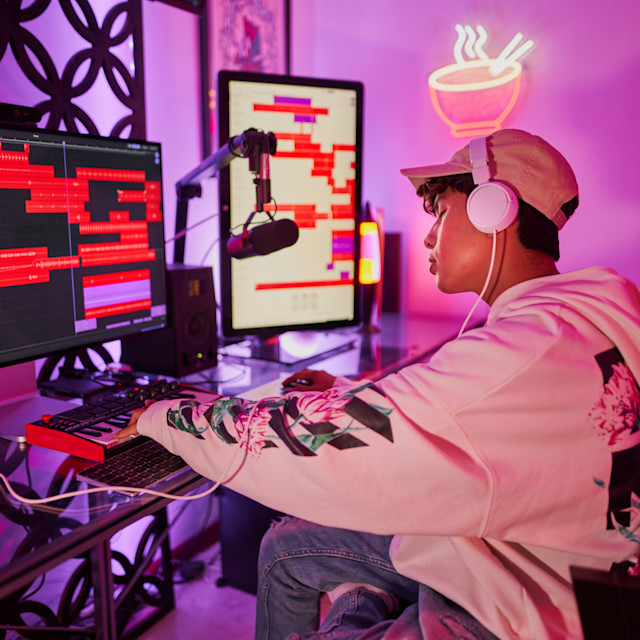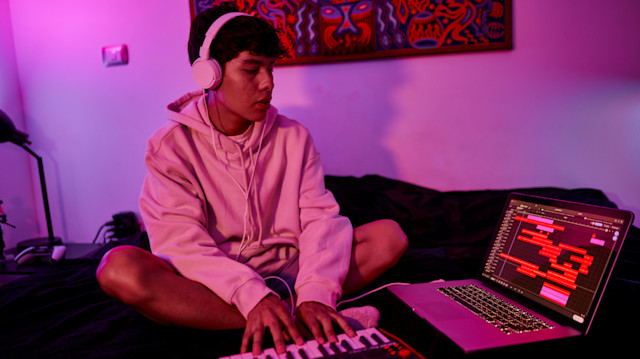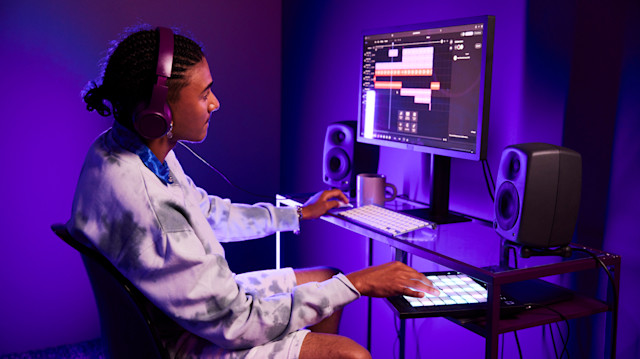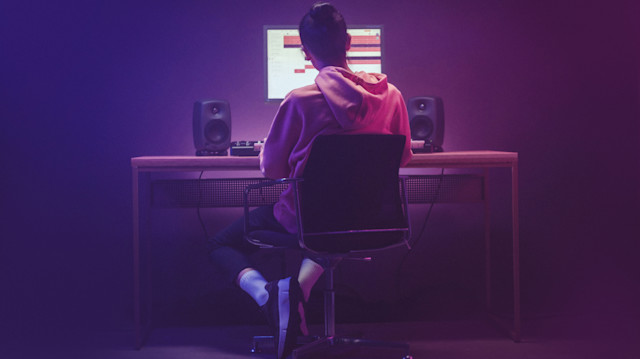How To Produce Music - 9 Steps to Get Started in Music Production
Find out what it takes to become a music producer and what you need to produce professional songs in any genre. In this article, we give you 9 tips from Soundtrap's in-house producer team on how to get started.

Music production is the art of taking a musical idea and turning it into a finished song. And because it is an art form, there is really no right or wrong way to produce music, what matters is the outcome.
Music production does typically, however, require some sense of creativity, an understanding of recording equipment and instruments, and knowledge of digital audio workstations (DAWs) like Soundtrap.
So, to make your journey into music production easier, we have collected the best tips from Soundtrap’s in-house producer team on how to get started as a music producer, what production tools you need to be successful, and what it means to work professionally with music production. Let’s dive in!
What does it mean to produce music?
The art of producing music isn’t as clear-cut as you might think. There are many different ways to produce music. Some are purely technical, like writing the actual music and recording it in a DAW. Other production tasks are more strategic, like creating a vision for a musical project, connecting different musicians to collaborate on a song, or simply financing and marketing the production of an album, single, or music video.
Highly esteemed music producers like Rick Ross and DJ Khaled rarely touch any instruments or program any notes in any software. They are however great at coming up with concepts, sounds, and visions for other artists, and that’s what makes them great music producers.
The technical aspect of music production typically involves coming up with melodies, writing lyrics, recording and editing, and mixing and mastering. A common process for a music producer is to create the background music, write the lyrics to a song, and then bring in an artist to perform the track while recording it. Ebony “WondaGurl” Oshunrinde is both a songwriter and producer who produces music in this way and has worked with artists like Rihanna, Travis Scott, Drake, and Masego, to name a few.
So it’s important to understand that “music producer” is a broad term and can mean different things in today’s music industry. Some producers make beats, some write songs and engineer recording sessions, and some just oversee the project at hand and assist the artist with financial, collaborative, and visionary support.
Below, we will mainly focus on the technical aspects of the music producer role. How to actually create music, what tools to use, and how to distribute it for the world to hear.

What does a music producer do?
Music producers are responsible for creating the sonic landscape for artists. A producer might build the foundation of a song in their DAW, with the beat, chord progressions, and top melodies, and then bring in other musicians to record instruments or other parts of the song. Once the music has been finalized, the artist who will perform the track is brought into the studio to record vocals. This is just one possible workflow out of many.
It is important that producers have a deep understanding of the recording process and how different instruments interact with one another. They should also possess great communication skills in order to foster positive relationships between artists and other musicians throughout the creative process.
In addition, successful music producers must be up-to-date on industry trends in order to stay current on evolving genres and production techniques. Swedish music producer Max Martin is a great example of someone who has evolved their sound over decades and managed to stay in high demand because of it. That’s why he’s gone from producing 90s artists like the Backstreet Boys and Britney Spears to today’s biggest superstars like The Weeknd.
Read more: How To Make Pro Beats
Does the producer write the song?
Whether the producer writes the song or not depends on the project. Many modern music producers are very hands-on in the music creation process. This involves coming up with melodies and creating the actual music in the studio. Sometimes the producer will even write the lyrics to the song, though it’s probably more common for a songwriter to develop the lyrics in collaboration with the producer.
Producers commonly act as creative partners to musicians and artists, providing feedback on lyrics, melodies, chord progressions, or beats. Ultimately, they are tasked with bringing out the best in a music creator’s work by making sure all elements are working together to create an impactful piece of music. With their knowledge of production techniques and ability to effectively communicate with collaborators, producers have become essential figures in today's music industry and greatly contribute to successful end products.
Bucket Beats Challenge: Producing a Hip-Hop/Trap Beat with Noize London
How to become a music producer
Making a living as a music producer is of course an exciting and rewarding career path if you love music, but it requires dedication and hard work. Even if you obtain a degree in music production, there is no guarantee that a high-paying job will follow.
To become a successful music producer, you need to hone your skills every day and work hard at it to become one of the few people that can live off their work in music. And in addition to spending countless hours in the studio, you will also need to be great at promoting yourself and your art, networking with other people in the music industry, and having a competitive edge that makes your music stick out from the rest. With that being said, going after an opportunity to do what you love for work can of course be 100% worth it.
And there is not a make-it-or-break-it point in a music production career. Most music producers start their careers on the side of their 9 to 5 jobs. In the beginning, you may only be able to produce music on nights and weekends and make a few extra dollars a month selling beats online. But as time goes on, the demand for your music could go up, and more people could begin enquiring to work with you, and slowly, you could start making the transition from a hobbyist to a full-time professional music producer.
So, if you’re ready to begin this fun and thrilling journey, these 9 steps below will certainly set you on the right path and help you get to your destination faster.
9 steps to get started in music production
1. Train your ears
One of the most important abilities a producer must have is the capacity to recognize and distinguish different sounds and instruments. You should practice listening to songs and recognizing the distinct components that make up a track such as drums, basslines, melodies, harmonies, etc. You should also pay attention to mixing characteristics. How are the vocals EQ:d? Are there a lot of reverbs and delays in the mix? Is the bassline subtle or upfront? This will give you insight into how songs are constructed and what methods are used in production.
2. Learn an instrument
One of the most important tasks for music producers is to come up with great melodies. To do this, you should learn how to play an instrument. Most digital producers today use some kind of digital synth that they hook up to their laptops. This is a great way to mess around with different chords and discover new melodies and beats that you can track and edit on your computer.
So invest some time in learning a little bit of music theory and then apply that to your instrument. This will be a great investment towards your future success.
Read more: Chord Progressions Explained - How to Write a Song With Instruments
3. Practice writing music
To be a great music producer, it’s essential to understand songwriting. Songwriting is an integral part of being a producer because it provides an understanding of how various instruments interact with each other, how a song should be structured, and what makes a hit. There are three important areas of expertise in songwriting that you should master to become a pro in music production.
Read more: How To Write Incredible Songs
Chord progressions
Chord progression is the term used to describe the order in which chords are being played in a song. This is the foundation of the song and dictates the mood, tone, and melody of a musical piece. Begin by experimenting with basic chord progressions and melodies before advancing to more intricate arrangements. There are a lot of good tutorials and videos online on how to build chord progressions.
Song structure
The song structure is very important for listeners to be able to follow along with a song. The standard structure for most popular songs is Intro - Verse - Hook - Verse - Bridge - Hook - Outro. But this of course varies depending on the genre. Arguably, the most important part of a song is the hook. This is where the song should climax and where you want your listeners to sing along. So you could start by writing a really good hook and then build out the rest of the song around that hook. Read more about song structure in our songwriting blog here.
Writing lyrics
Writing great lyrics is a different skill set than writing music. But if you’re good at writing lyrics in addition to producing the instrumental parts of a song, you will have a strong competitive advantage as a producer. Good lyrics should be relatable, easy to understand, and fun to sing along to. They should also convey a message and have a meaning. Other than that, there aren’t any strict guidelines on what your lyrics should be about. Study your favorite songs and try to rewrite those lyrics from your perspective. That’s a good place to start.
4. Decide on music equipment
You can’t build anything solid without the right tools for the job. A professional music producer will acquire countless pieces of music equipment over the years, from MIDI keyboards to guitar pedals, to a setup of 15 different recording microphones for different purposes.
But starting out in music production, having a high-performing computer, a keyboard synth with USB connection, and an audio interface with a microphone is sufficient enough. This physical equipment will allow you to build out beats and melodies, practice your songwriting, and record vocals and analog instruments in your studio setup.
And acquiring studio equipment is a lifelong journey for a music producer. Once you start making some money, you can update or add to your equipment. Remember that equipment is just tools to make the music production process smoother. It’s the person behind the equipment that makes the magic happen. Most super producers today started with the simplest setup. It’s their creativity and perseverance that made them who they are today.

Soundtrap's online DAW lets you produce music in any genre
5. Get comfortable with a DAW (Digital Audio Workstation)
The DAW is a music producer’s canvas. This is where the music is put together, recorded, edited, mixed, and mastered. It’s also the game that we’re in!
Soundtrap is an all-in-one Digital Audio Workstation that’s available online, on any device. This means, for example, that YOU can produce the chord progressions and beat in Soundtrap, invite a collaborator via a link to lay down melodies with another instrument, and then have a third person go in and record vocals from their studio. Just like a Google Doc for music production.
It’s important to find a DAW that you’re comfortable with and that meets your needs as a producer. Soundtrap’s online studio is easy-to-use and powerful enough to make hits in any music genre. It also has pre-made loops and sounds so that you don’t have to start from scratch. Simply pull up a pre-made demo project and start building on top of it to make it your own. Try Soundtrap for free and see if it’s the right choice of DAW for you.
6. Set up a studio (at home or rent a place)
The evolution of digital music equipment and online DAWs like Soundtrap have made portable music making easier and more convenient. But if you’re serious about making music production your profession, you should really consider getting a proper workspace. Building a really nice home studio doesn’t have to cost a fortune and is a great option if you want 24/7 access to your music making space. If you want some tips on how to set up a home studio, check out this article on the Soundtrap blog: 7 Steps To Set Up A Music Recording Studio at Home.
If you don’t have room for a studio in your own home, there are other options out there. Most cities have recording spaces for rent or you can check producer forums online to see if someone is looking to share their studio with other musicians. Google is your best friend here.
7. Find artists to work with
As mentioned earlier, collaboration between producers, musicians, and vocalists is essential to making chart-topping popular music. The role of the producer is to put together a musical project through different musicians, instrumentalists, and singers. So you should start networking with other music producers and artists from day one.
When searching for collaborators try approaching them through social media like Instagram & Twitter or even attending open mic nights near your area! Also, attending music industry events and workshops are great ways to make new connections in music.
8. Get good at recording, mixing, and mastering
We have separate articles on the process of recording, mixing, and mastering, so we’ll just underline the importance of all three in music production. You won’t necessarily do all three of those production steps in your job, but you will need to have a good understanding of them.
Sometimes music producers will send off their project to a mixing or mastering engineer, or have a studio engineer record the tracks to a song. But if you don’t know what the outcome of a good mix is supposed to sound like, how will you be able to know what you’re looking for during these steps? So read up on material on these techniques, watch tutorials, and practice on your own songs. If you do, you will be well-equipped to manage each stage of music production going forward.

Building a home studio doesn’t have to cost a fortune and is a great option for beginner producers.
9. Distribute your music and network with labels
Ultimately, distribution and networking is key if you want to reach a wider audience. To get your music on Spotify, you should sign up for a digital distribution service. You can find a preferred list of distributors here.
Once your sing is live, Spotify for Artists offers a wide range of tools to promote, analyze, and monetize your music in an easy way.
You should also initiate relationships with labels and publishers that specialize in genres similar to yours since they would already have a pre - existing fan base interested in hearing fresh content from upcoming artists. Send an email to their A&Rs and introduce yourself along with a few demos of your work. This could prove to be a good start to a career in music production Good luck!
Produce music with Soundtrap
Soundtrap is the all-in-one platform for music production online. If you’re serious about music production, our web-based music studio is a great place to start. Soundtrap lets you create songs in any genre from scratch, or why not get inspired by over 25.000 pre-made loops and samples from our sounds library?
Our instrument presets and mixing effects lets you record, mix and master your songs to perfection. You can also collaborate in real-time with anyone from across the world, on the same project. Soundtrap is music production made easy, yet powerful! Get started with your free account today.
Read more on producing music
Basic Music Theory: An Introduction for Producers and Songwriters
Soundproofing Tips for Music Producers: Make Your Home Studio Sound Better
How to Produce Music: The Complete Guide to Drift Phonk
How to Produce: The Complete Guide to Making Pop Music
Kom igång med Soundtrap idag!